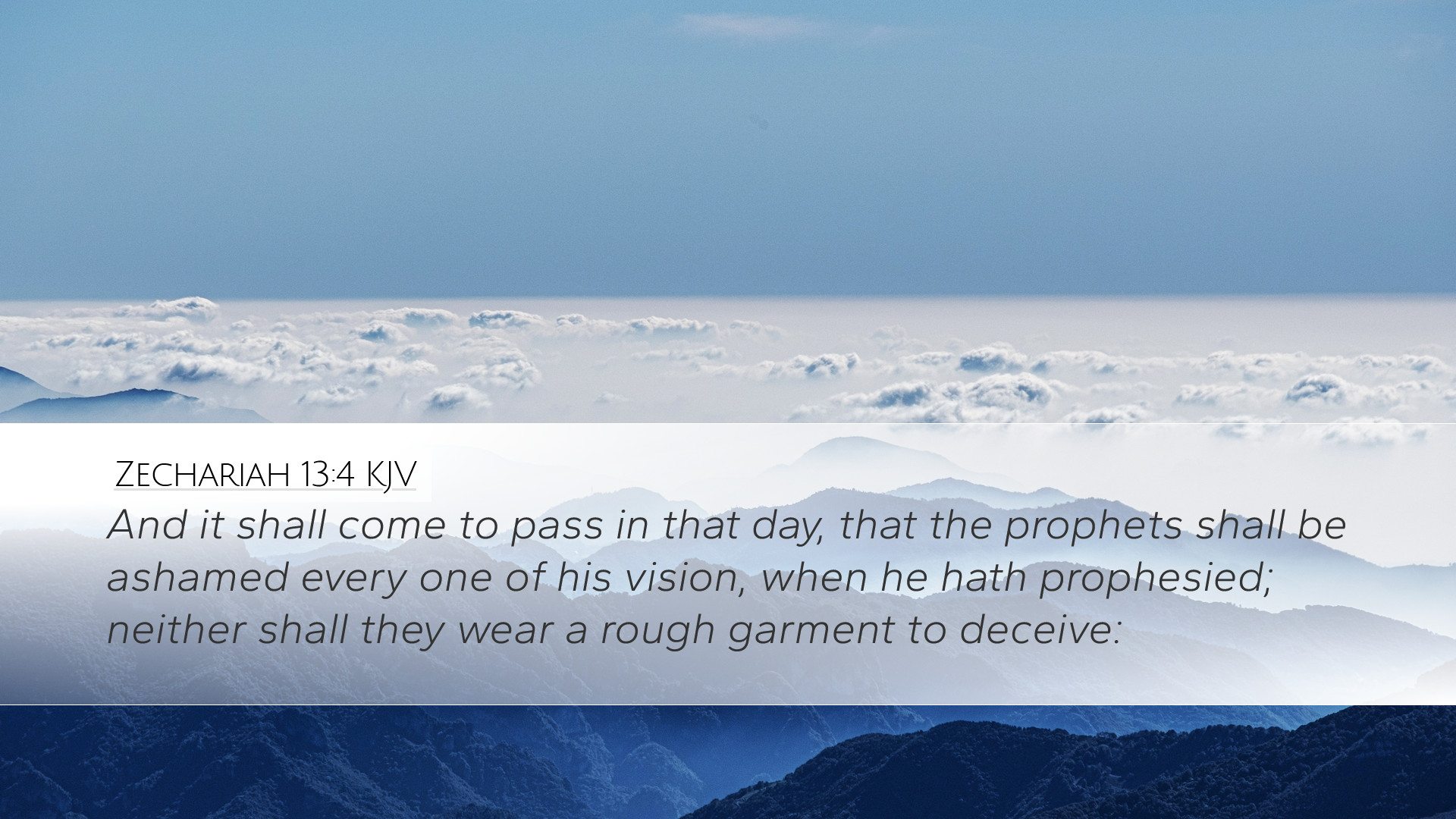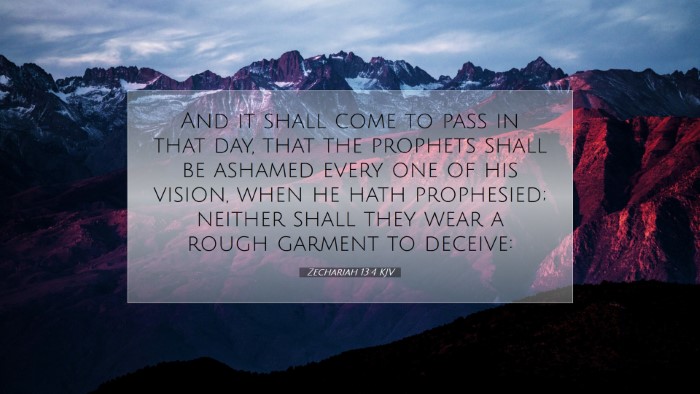Old Testament
Genesis Exodus Leviticus Numbers Deuteronomy Joshua Judges Ruth 1 Samuel 2 Samuel 1 Kings 2 Kings 1 Chronicles 2 Chronicles Ezra Nehemiah Esther Job Psalms Proverbs Ecclesiastes Song of Solomon Isaiah Jeremiah Lamentations Ezekiel Daniel Hosea Joel Amos Obadiah Jonah Micah Nahum Habakkuk Zephaniah Haggai Zechariah MalachiZechariah 13:4
Zechariah 13:4 KJV
And it shall come to pass in that day, that the prophets shall be ashamed every one of his vision, when he hath prophesied; neither shall they wear a rough garment to deceive:
Zechariah 13:4 Bible Commentary
Commentary on Zechariah 13:4
Zechariah 13:4 states: "And it shall come to pass in that day, that the prophets shall be ashamed every one of his vision, when he hath prophesied; neither shall they wear a rough garment to deceive." This verse portrays a significant turning point in the prophetic ministry during the eschatological period foretold by Zechariah. Below, we explore insights from notable public domain commentaries to enrich the understanding of this passage for pastors, students, theologians, and Bible scholars.
General Context of Zechariah
The Book of Zechariah offers a prophetic vision concerning the restoration of Israel after the Babylonian exile. This chapter, in particular, speaks to the cleansing of the nation and the coming of a transformative era. The verses preceding and following 13:4 suggest a deliberate shift towards purification and the rejection of false prophecies.
Insights from Commentators
Matthew Henry Commentary
Matthew Henry emphasizes the moral reformation that will accompany the coming day of the Lord. He highlights the shame experienced by the false prophets as a sign of divine judgment against those who misled the people of God. Henry notes the significance of the "rough garment" traditionally worn by prophets to symbolize their calling and divinely inspired messages. In a future context, this garment will no longer be necessary, as true prophecy will be evident through God's authentic revelation.
Albert Barnes Commentary
Albert Barnes reflects on the cultural aspects of prophetic office in Israel. He points out that the popularity and social standing of prophets were often tied to their ability to deliver messages that pleased the people. However, in the coming judgment, this will be reversed, and prophets will experience shame due to their false visions. Barnes articulates that this shame signifies a restoration of truth and integrity within the prophetic community—a necessary precursor to the authentic worship of Yahweh.
Adam Clarke Commentary
Adam Clarke provides a nuanced interpretation of the phrase "when he hath prophesied." He suggests that the prophets will not only be ashamed of their past deceptions but also of the extravagant hopes they once placed in their visions, which did not originate from God. Clarke’s insight reveals the spiritual blindness that can accompany deceitful prophecy, challenging church leaders and believers alike to remain vigilant against self-deception and manipulation.
Theological Implications
This verse raises profound theological conversations regarding the nature of prophecy and truth. Understanding that God's true prophets will be ashamed indicates a critical alignment of prophecy with divine intention, leading to genuine worship. It calls believers to evaluate their own lives and the messages they receive in light of Scriptural truth.
Impacts on Ministry
- Accountability in Prophecy: The verse warns against the dangers of speaking presumptively in the name of God. Ministers are called to a high accountability regarding their messages.
- The Need for Discernment: Church leaders are encouraged to cultivate discernment among congregants to distinguish between true and false prophecies.
- Redemptive Purpose: Even amid judgment, there is a promise of restoration and purification, which should encourage hope in their ministries.
Practical Applications
As a passage of spiritual significance, Zechariah 13:4 prompts several reflective applications for today’s believers:
- Self-Examination: Believers should examine their own lives for influences that lead away from biblical truth.
- Community Vigilance: Encouraging church communities to hold one another accountable for the truth in preaching and teaching is vital.
- Elevating Truth Over Popularity: Emphasizing that fidelity to God’s Word should take precedence over societal and cultural expectations.
Conclusion
Zechariah 13:4 serves as a compelling reminder of the serious nature of prophetic ministry and the paramount importance of truth. As believers and leaders study this passage, may they be inspired to uphold the integrity of God’s Word and remain steadfast against influences that deviate from authentic biblical revelation. The prophetic voice must always echo the eternal truths of scripture, leading the faithful into a deeper relationship with the Almighty.


